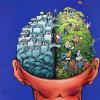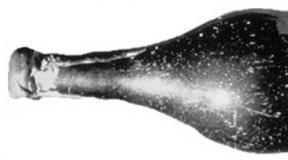How to reduce addiction to social networks. Dependence on social networks. Social network addiction problem. Addiction treatment. Addiction symptoms
Literally ten years ago, the term "social network" did not evoke any associations in us. And the Internet has not been so firmly included in the daily life of a person. For the necessary information, we went to the library, and communicated with friends and relatives either in person or by phone (home, with a wheel). Remember this time? In fact, it is very difficult to imagine that communication was once so “alive”.
Today, you won’t surprise anyone with the names “Vkontakte”, “Odnoklassniki”, “Facebook”, “Twitter” or “Instagram”. Surely, everyone is registered in at least one of these social networks, and maybe in all at once. But the time and purpose of being on social networks is different for everyone. Someone visits their page solely to chat with friends, someone to listen to music, and someone seeks to learn as much as possible about their friends and comrades by viewing photos and news ("news feed").
Today, psychologists, along with alcoholism and drug addiction, increasingly mention the dependence on social networks. Indeed, with the advent of such "benefits" as the Internet and social networks, those who began to abuse these "benefits" immediately appeared. And every day they began to become more and more. Why are so many people, "having got into the network", can no longer get out of them?
Causes of Social Media Addiction
The first reason why social networks are so attractive to humans is that when we "roam the expanses" of social networks, the pleasure centers in our brain are activated. Positive ratings (“likes”) and nice comments to our photos are great for this. What do we do when we get a good feeling? Right. We return to the network to get it again. So it turns out that the more a person is approved on a social network, the more time he spends there.
The second reason is related to the peculiarities of human perception of information posted on social networks. We get it quickly and little by little. Moreover, this information is extremely diverse and heterogeneous. For example, by going to the VKontakte website, we can immediately turn on the music, while simultaneously viewing brief news, small notes and articles, comments, and at the same time we still have time to respond to friends' messages. Our brain begins to quickly adapt and get used to this pace. It's like a quick and easy process of popping seeds.
Here it is also worth emphasizing the heterogeneity of the information received. This distinguishes it from information in search engines. To find something in a search engine, such as Google or Yandex, you need at least to know exactly what to look for. Moreover, it is still necessary to formulate a sufficiently clear request. And this, of course, requires some time and effort. In turn, to find something interesting on a social network, such efforts are not required - you just need to open the news feed. Thus, social networks attract people mainly due to their accessibility, simplicity and diversity.
The third reason is those who are insecure, suffering from complexes, such as, for example, an “inferiority complex” with their appearance, or they lack attention in real life. And in social networks, few people know who we really are, because if we have a rich imagination, you can present yourself as a hero-lover, macho or just a super smart genius.
Negative effects of social media addiction
So, we learned why social networks are so attractive to people. Now let's see what, in fact, is the danger of too active use of social networks? Why, in this case, scientists are increasingly using such a harsh word - "addiction"? This is due to the fact that dependence on social networks causes a whole fan of negative consequences, both for the person himself and for his loved ones. Let's consider them in more detail.
Firstly, very frequent and prolonged stay in social networks leads to the so-called attention deficit disorder. This means that a person loses the ability to concentrate on one thing for a long time. To explain this, it is enough to remember how we receive information on a social network - quickly and in small portions. People who are dependent on it become so accustomed to such a “portioned” mode of obtaining information that after a while they can no longer, for example, be engaged in solving any task for a long time. Indeed, on the Internet, we often have to switch our attention from one to another: here we are listening to music, then we are reading a short article, and now we are writing a message. Over time, even reading your favorite book can become difficult, because the brain, out of habit, begins to constantly “look for” reasons to switch to something else.
In this sense, the younger generations are of particular concern, since they have not “climbed out” of the Internet and social networks since childhood. Their thinking is very plastic and very easily influenced. Therefore, dependence on networks represents a special danger for children and adolescents, which is becoming extremely difficult to avoid in the modern world.
Thirdly, very often the "abuse" of social networks causes a syndrome of constant fatigue, as well as stress. Although scientists say that the possibilities of the human brain are almost limitless, it still needs some rest. At least in order to process and structure the information received. When a person is constantly online, the flow of information to the brain practically does not stop. This overloads the brain. Therefore, a person begins to feel constant fatigue and is in a stressful state.
Fourthly, too active communication in social networks often leads to the loss of “live” communication skills. Perhaps this is the most obvious of the negative consequences of this harmful addiction. Constantly communicating on social networks, we very often lose the emotional component of our communication with friends and relatives. There is simply no time for emotions online. Music, comments, "likes", news, and just in between - a message written by touch.
And finally, fifthly, as a result of all the above consequences, a person receives a general decrease in intelligence. Here, of course, the same features of "network" information play a decisive role. A person loses the ability to concentrate on one thing, find a solution to an important problem, or seriously think about a task. His brain can no longer work effectively. He gets used to simply receiving an endless stream of information without analyzing it in any way. It turns out that a lot of information comes in, but it is not absorbed and, as a result, a person does not know anything.
These negative consequences are enough to imagine and appreciate a little the gravity of the situation.
I would also like to note that most people who are addicted to social networks still have alcohol or at least nicotine addiction, and those who have not yet encountered this are on a direct path to alcoholism or drug addiction, given the fact that social networks are now not only a mass media, but also a trading platform for alcohol and drug dealers, the latter, in turn, are actively engaged in promoting goods on the Internet, which can be purchased almost without leaving home for a long time. And most of the well-known and famous people, whom modern youth is so accustomed to equaling now, in their work make alcohol and drugs an integral part of life leading to “success”, which, with one click, immediately appears on social networks, and therefore in mass access. Then it may happen that we will have to face more than one addiction.
"Symptoms" of social media addiction
It is well known that any addiction is also a kind of disease that has its own symptoms. Social media addiction is no exception. She also has certain "symptoms", although not as categorical as, for example, the flu. So, how do we "diagnose" this disease in ourselves?
The first and most obvious symptom is that you spend a lot of time on social networks. In a good way, you should not sit there for more than an hour a day. Although this is a very relative figure. If you work tirelessly from early morning until late at night, and before going to bed you have only an hour of free time that you spend online, then it’s worth considering. This symptom also suggests that a person constantly wants to be "connected" ("online"). He does not leave the feeling that while he is not online, something extremely interesting will happen there: unique news will appear, someone will comment on his photo, or one of his friends will post their photos from a recent trip.
The second symptom is the appearance in your colloquial speech of the most typical jokes and expressions for the network. For example, expressions like “ss” instead of “thank you”, “preved” instead of “hello”, well, and other jokes popular on social networks can serve as an alarm bell.
Symptom number three is an overgrown photo album. If you post daily photos of your loved one (“selfie”) in absolutely ordinary life situations, or photos of food, legs, hands, nails, eyebrows - in a word, everything that you see around you - this is also a cause for concern.
The fourth symptom is to “sit” all day on some social network without communicating with anyone. Do you remember why they were originally created? For communication.
And, finally, the fifth symptom - turning off the Internet causes you to panic, feel isolated, lonely, cut off from the world, and even depressed. Although in fact, only when the Internet is turned off and there is no access to social networks, we truly live and communicate. We must try not to forget about it.
If you are experiencing one or more of these symptoms, it is very likely that you have some sort of social media addiction. In this case, you should immediately contact the experts.
The social network is a universal means for communication. But such resources cause addiction to social networks, although they allow you to find friends around the world. Being completely dependent on social networks, a person cannot live a day without looking at his page or at the page of people he knows.
Teen addiction to social media
Dependence on social networks makes people constantly be in online communication, forgetting about real people and real time. Getting into such a state, some individuals begin to rapidly spend all their savings on paid mailings of information, reaching complete fanaticism. Over time, such persons, without realizing it, constantly check e-mail, pages in social networks.
The longer a person spends time for virtual communication, the more difficult it will be for him to do without Internet opportunities. Social media addiction is similar to drug addiction or alcoholism. A social network and craving for virtual interlocutors is a kind of psychological disease that occurs due to a lack of attention from people around you or your own internal complexes.
Signs of Addiction
Among the common signs of dependence on social. networks are characterized by such indicators:

All of the above signs directly say that a person has a strongly pronounced dependence on social. networks on the Internet, and it will be difficult to get rid of this condition without the help of a psychologist. If a person feels this craving for social networks at an early stage of communication on the network, there are chances to correct the situation on their own.
Causes
 Persons who do not lead an active lifestyle and social activities are most susceptible to the dependent state. Thus, they try to keep abreast of what is happening through communication with virtual friends. With the help of networks, they pass off the desired image as a real one, living an illusory life. Among the main reasons that form the dependence on the social network, we can distinguish:
Persons who do not lead an active lifestyle and social activities are most susceptible to the dependent state. Thus, they try to keep abreast of what is happening through communication with virtual friends. With the help of networks, they pass off the desired image as a real one, living an illusory life. Among the main reasons that form the dependence on the social network, we can distinguish:
- A minimum of communication among comrades or with family. Social structures make it possible to replace live communication.
- dissatisfaction with the environment. If there are problems in the family or school, at work, then virtual life has the power to change the concept of yourself and others.
- Problems of social adaptation. Teenage dependence on social networks leads to the fact that a person behaves insecurely, and a second life on the network helps him to integrate into society.
- Lack of self-realization. This happens due to the loss of oneself, inability to express oneself, loss of interest in various activities.
- Social unclaimed. With the provided services of the social web, such persons have the opportunity to feel in demand.

For your information:
Almost all persons with pathologies of appearance or serious disabilities replace social networks with communication with real people.
Consequences of Addiction
Addiction to social networks is a violation of the mental health of an individual, and physical changes are a consequence. These include vision problems, headaches, digestive dysfunction, back pain, sleep disturbances, and more. Like any addiction inherent in humanity, social. network addiction has its consequences in the form of a constant desire to receive new information, view a diverse number of photographs, which leads to a loss of perception of real information with the development of inattention, loss of concentration.
A person will not be able to concentrate on extraneous things, as the brain will return to other people's problems and information. Adults will need to carefully monitor the time spent by the child on the network, since the child's psyche is more susceptible to susceptibility when Internet addiction to a social network is formed.
Prevention
 In order to prevent, you need to follow these rules:
In order to prevent, you need to follow these rules:
- Communicate more in person or over the phone. In his free time from communication and classes, walk on the street, visit friends.
- Set a limit counter for staying on the Internet. This will help to overcome the cravings for constant viewing of the news feed and incoming applications over time.
- Install a utility that reminds you of the time spent on a social network. At the end of the time set in the program, the user automatically exits from his page.
- The cardinal way to win is to delete your account on the social network. This method is the most effective on the way to a fulfilling life and real communication.
Network addiction is a bad habit that needs getting rid of. After all, real real communication and physical activity is more interesting and varied, and it will also bring more pleasure and benefit.
Attention!
The information in the article is for informational purposes only and is not an instruction for use. Consult with your physician.
Psychologists say that today's younger generation and middle-aged people are so accustomed to communicating on social networks that many of them have developed a serious addiction.
If a person in the morning after waking up immediately opens the Internet in his mobile phone or on a computer, then this is a serious reason to think. People are accustomed to consider such a habit completely harmless. Incessant communication and reading posts on social networks can not only steal precious time, but also lead to the development of diseases.
As a rule, adolescents are addicted to social networks in the first place, due to their age it is difficult for them to make new acquaintances, and instead of active (live) communication with their peers, they choose such leisure. However, among the addicts you can find people of an older age category.
Internet addiction can be identified by a number of symptoms. The well-being of a person who spends a lot of time on social networks depends on the availability of the Internet. If for some reason access to a social network is impossible, then his mood abruptly disappears. There are changes with an addict. He loses interest in socialization. He takes walks much less often.
Suffering from Internet addiction, loses the skills of communicating with people. Any dialogue on the street with an unfamiliar person can cause stress. He endlessly presses the button to refresh the page on social networks. In such people, vision deteriorates, there are pains in the eyes. This is due to the fact that a long stay behind a bright screen worsens the eye muscles. There are problems with the back and joints. When sitting for a long time, blood stagnation occurs in the pelvic region. For men, this is fraught with problems of fertility and potency. A cyber addict often suffers from insomnia.
If you observe yourself or your loved ones, notice similar symptoms. It is better to seek the advice of a qualified psychotherapist. Dependence on social networks often has the following form of manifestation. A person subject to the Internet himself is not able to recognize a habit as a disease, for this it will be necessary to convince him.
HOW PEOPLE BEHAVE IN THE VIRTUAL WORLD
Let's imagine that Instagram and WhatsApp have crashed around the world. Think about how it made you feel. By trying to send or open videos or photos, but could not do it. Many users most likely experienced such strong annoyance that they were ready to smash their phones.
It is worth admitting to ourselves that people are addicted to the time spent on social networks. They create their own pages, while inventing their own world (virtual). Show it to others. They invest a lot of time and energy in its filling. This manifests itself in the form of tracking trends and fashion trends. A person spends his evenings processing photos, painting his appearance to the ideals invented by someone, but who came up with these ideals? Who said that such an image and manners are beautiful?
The girl who was abandoned by the young man immediately undertakes to demonstrate with the help of photographs on social networks “whom he lost”. And by the number of likes on the photo, she determines who is his new passion.
What do those tied to social networks do for getting small virtual hearts. In pursuit of likes, people do things that are unusual for them or post photos with barely covered intimate parts of the body. In general, whatever they do in pursuit of attracting attention in the virtual world. There is good news, likes on Instagram will soon cease to be visible to outsiders. They will be hidden in such a way that no one can see them, except for the account owner himself. All other users will only see the last couple of likes.
In modern times, almost all people are bonded to social networks. This is not even about the obvious fact that we spend most of our time there, but this brings significant harm to our health. The morale of a person can change dramatically if the number of views of his videos and photos on a social network drops a little. What is scary in this situation is that a person is not able to control these feelings. He is the slave of the people who developed such networks. And all bloggers are doubly slaves, since the only way to make money for them is Instagram.
People need to learn to control themselves, not to become maniacally addicted to the world of social networks. It is worth remembering that this is far from being the most important thing in our life.
How much time a person devotes to virtual life, and how much useful he finds. Does it bring him pleasure? The answer to this question is an unequivocal “yes!”. But, unfortunately, this influenced the fact that a person began to refuse real pleasures, communication with loved ones, meeting friends, spending time reading books, evening walks and sporting events. In this case, it is necessary to take measures to reduce the time spent on social networks.
The first step is to set goals. Ask yourself how long would you like to be free from the Internet. Task number two will be to conduct an analysis indicating the amount of time per day spent on the Internet. At the same time, note how much benefit is received from this time. More often than not, the results are disappointing.
It is necessary to plan business and entertainment for a month. The list must contain any items. The only exception will be spending time on social networks. It can be a trip to the theater, a walk with friends, an invitation or a trip to visit, and much more.
Making time for the Internet is also a necessary part of the action. For example, it could be one o'clock in the evening. Or any other time you can afford to relax and read the news. But after the allotted time, all gadgets must be postponed and switched to another activity.
The state of discomfort must be endured. The first days the hand itself will reach for the smartphone that has been familiar for a long time. But it can and must be experienced. Moreover, it can be opened again the next day.
It is worth planning your day, while observing the regime. A busy person will more easily survive time without a gadget. An internet addict's best friend is boredom.
We need to remember the pleasures. The release of the hormone "dopamine" that is released when social networking is an easy way to get pleasure. A person seems to have positive feelings, but in fact they are empty.
Write a list of your pleasures that exclude the use of the phone. Reduce subscriptions and incoming notifications. Remove icons of frequently used applications.
Fingers in automatic mode will start opening applications in place of instagram, soon the habit of pressing it all the time will disappear. An hour before going to bed, it is not recommended to use any gadgets, be it a phone or a computer. This is essential for sound and healthy sleep.
HOW NOT TO GET ON THE INTERNET APPLICATIONS
Psychologists often mention that along with alcoholism and drug addiction, subordination to social networks does not recede. Indeed, with the advent of this type of entertainment, there were also those who began to abuse the leisure of this type. The reason for such an attractive action for a person is that, wandering through the expanses of the Internet, the pleasure centers are activated in his brain. That is why he goes back there again.
If we give as an example, some of the consequences of such a habit, then we can imagine the seriousness of the whole situation. The ability to focus on one thing for a long time is lost. Abusing social networks, a person is in a state of constant fatigue. Fatigue brings stress. There is a decrease in the level of general intelligence.
With the development of the Internet, the spread of gadgets and the general immersion in social networks, it is quite difficult to refuse to constantly check Facebook, Vkontakte, Instagram and other accounts. We have selected for you some tips from the book "Jedi Techniques" that will help you get rid of your addiction to social networks.
Strength of will
Checking social networks stimulates the neurotransmitter dopamine produced by our brain. That is why it is very difficult to stop doing it. However, many try to “endure” a certain amount of time without social media, but this does not help. The fact is that with the help of willpower, it’s enough to defeat addiction - it’s like hanging on a horizontal bar, trying to defeat gravity with the power of your hands. Gravity will still take over - it's just a matter of time. And the longer you hang, the closer this moment is.
So you need a different approach.
Addiction
The first thing you need to do is deal with yourself. If you find yourself diving into your smartphone a lot in public places, getting angry when people tell you about it, and hiding behind hastily made up excuses like urgent work, don't panic. It's just an addiction. People stop drinking and smoking, you are also quite capable of coping. But first, admit it to yourself - it's an addiction!
To do this is not as easy as it seems at first glance. However, once you acknowledge that there is a problem, it will be much easier for you to deal with it.
Turn off notifications
It is also important to get rid of any reason to check social networks. Turn off notifications on your computer and phone that urge you to read a new message or interact with your gadget in some way. Otherwise, all your work will go down the drain - after all, constant notifications will distract you from real life and you will again “stick” on social networks.
Take it step by step
No need to demand from yourself once and for all to stop visiting social networks. This is the reason for the main failures. Try adding daily repetitive tasks like "spend fifteen minutes reading the news" to your list.
If one such task is not enough for you - breakdowns occur - try to perform two such tasks a day. While doing these tasks, keep track of the time with a timer so that you don’t get stuck on social networks for several hours.
The next time you feel like you really, really want to see what's going on in the world, or what the population of Thailand was like during the Sukhothai era, just say sweetly, “Of course, of course we will. You remember - we have it planned.
Reading time: 3 min
The problem of addiction to social networks is seen as a real threat to the psyche, along with chemical addictions that change personality and the ability to socially adapt. Availability, prevalence and features of the construction of network communications themselves are able to satisfy any human need. There are standard ones, designed for a wide audience, and there are highly specialized ones, where people can satisfy their professional interests or develop. Twitter, facebook, instagram exist for the main consumers and are widespread, networks with a medical or IT direction are less popular, but more in demand among a narrow audience.
Positive is the ability to exchange any information, look for like-minded people even while in prison or among spiritually strangers. Many professional industries are also moving to social networks - here you can find vacancies and a suitable employee, no longer focusing on standard resumes, but recognizing a person as a person by scrolling through his profile. You can book places to stay and arrange joint trips in the relevant groups, creating your own page helps to promote your creativity, and without the use of social networks it would be more difficult and longer.
This is a way to earn money or raise funds for charity, an opportunity to help law enforcement agencies with a violation report or a found wallet or passport. A huge number of positive moments are born precisely due to the fact that there is an association of people using all the possibilities of the Internet. The downside of this phenomenon is only the emerging psychological dependence on social networks, after which a person practically refuses to live in the real world, completely transferring his communication and any other social contacts online.
Causes of Addiction
The dependence of young people on social networks is explained by the fact that this is a cult of the present. It is no longer fashionable to drink, use drugs or smoke, but it is fashionable to blog, record stories and upload photos about each event. The older generation uses Internet communication much less often, and also resorts to the problem-solving formats that are offered in social networks. Those who were looking for lost things still turn to the police, and those who met through mutual friends do not start looking for a companion through identical subscriptions.
In addition to age conditioning, it is worth remembering that developers are constantly improving functionality, making communication easier, and content colorful and enjoyable. A huge number of settings helps to create the world that is convenient for you directly - the ability to add friends and maintain privacy, adjust who will know what news or receive comments. Here you can unsubscribe and not see what you don’t want to see, no one will force you to interact with unpleasant people.
Everyone creates their own ideal world, which is more attractive than the real one, constantly available (now there are more chances to get an answer in the messenger than that a person will come to a meeting or pick up the phone), and also those people who meet which is even impossible in reality (we do not take into account that these people can add you not out of interest, but out of politeness). Regular confrontation with a stressful reality forces us to seek refuge in an alternative one, increasingly looking into the social network and increasing the gap.

Over time, a person begins to produce hormones of joy from the time spent there, various paid content are introduced, with additional functions, and there is the involvement of payment, where marketers connect mechanisms of influence on the subconscious. For some, the social network is the only place where there is an opportunity to receive recognition. Everyone needs praise and psychological strokes, so if in reality there is no recognition of the beauty, talents or mind of a person, then he will strive for the world where it is.
In addition, a large number of complexes associated with adolescence form the dependence of adolescents on social networks, and online communication creates a feeling of some kind of facelessness, freedom, and irresponsibility. You can properly select a photo and generally upload an anonymous avatar and create a fictional personality that you want to be, to realize your dark sides there.
Signs of Addiction
Signs of social media addiction include both emotional and behavioral, some of which are common with any type of addiction, and some that are exclusively specific to Internet communication addiction. The first sign of addiction to social networks is the emergence of an irresistible desire to go to your page or watch news in a group, check the number of likes or new comments. On an emotional level, a person does not have access to an analysis of the lack of the need for every minute check, and instead of it, anxiety and fear may be present.

Then there is a loss of temporary control, which eventually begins to lead to a material real life and failure to fulfill certain obligations. So, not realizing that it took not a few minutes, but a couple of hours to check likes and photos, a person misses meetings or does not do the necessary work. It may turn out that the complaints of real close people are becoming stronger, the person is accused of insufficient attention to his own family and everyday problems. The addict himself may consider these complaints inappropriate, zealously discuss with Facebook friends the illegality of the family's demands, and they will support.
The only difference is that then everyone will close the browser and find themselves with their families, and someone will quarrel with them for the sake of the love of unknown subscribers. Problems move to a completely physical and material level - sleep may suffer in order to unsubscribe and answer everyone in time, an addict may not eat or drink while on a social network, or just sit on coffee all day long. This pulls not only the problems of interaction and health disorders, but also the possibility of normal independent financial support.
A high level appears if there is no connection to the satellite or the possibility of open Wi-Fi. Quarrels with partners can start because of social networks - who liked who or forgot what other users commented on. The methods of sorting out relationships are adjusting marital status and removing each other from the list of friends - this is typical even for married couples, and the understanding that this is only a surrogate for interaction and that a person removed from friends will not get out of your common kitchen does not prevent another from doing such deeds.
The desire for constant attention through avatar changes, new photos and constant post updates speaks not only to addiction, but also to the lack of attention and recognition that finds saturation in this way. Even your own addiction to social networks can be recognized by the fact that you met with friends a year ago, while swearing eternal friendship and saying that you miss it, transferring all communication into daily correspondence.
Who is addicted - personality types
There are certain prerequisites that contribute to the development of addiction - a sense of self-doubt, insignificance and low self-esteem, as well as multiple complexes that drive a person into a state of inability to have normal contact with society. The possibility of self-realization against the background of these complexes or simply the lack of the ability to do forms a dependence not on the closest circle, but on those who understand, but far away.
An important factor in the formation of dependence on social networks is loneliness, and not so much actual and formal as internal.

Naturally, those who are on the northern watch do not have the opportunity to contact at least someone, but there are also residents of megacities who close themselves from neighbors, colleagues and passers-by, opening up only to those who are really close in spirit. Behind all this is the need for approval and emotional strokes, a spiritual hunger for love, stretching from childhood. The psyche can exist in an undisturbed state only when there is social communication and encouragement in it, therefore, initially, dependence is formed as a protective mechanism for survival.
Often people who are prone to social media addiction are quite infantile, so those who sit in chats and groups are either teenagers or have an immature personality. Regardless of age, it is a comparison of opinions, the implementation of actions for the sake of an interactive community and the preference for conclusions based on what is inspired, rather than independent analysis.
Deceit can also be pushed to the maximum presence on the Internet, since there you can both present yourself as any person and speak any views, promising anything or even directly deceiving others for the sake of profit.
Sensitivity to criticism instead of the ability to resist or not react here is quickly edited. A person regulates his acquaintances and the feed in such a way that he does not meet with an unpleasant opinion and eventually gets hooked on social networks, because only there the feeling is created that they are accepted and understood.
Also, one of the features of all addicts with an emphasis on photography - constant selfies, laying out their purchases, trips or achievements speaks of the need to maintain the level of their significance and the person's confidence that someone is so interested in his life. And also dreaminess and attempts to find yourself in a better world can lead to addiction, when seemingly bright thoughts lead to the fact that a person begins to fall out of reality, and it doesn’t matter where to drugs or social networks.
How to get rid of social media addiction
To overcome addiction, you will have to hold out on willpower, because. any dependence is also formed at the hormonal level, so a lack of dopamine will push back through the tape.

It is necessary to load yourself with pleasant events as much as possible, because this is not a constructive strategy, especially in the fight against addiction.
You will have to initially take care of reducing provocations - get into the settings of all applications and turn off notifications of any events - sounds and reminders of all birthdays, comments, likes and messages can be distracting throughout the day, creating a feeling of anxiety when the phone does not make sounds - then a person climbs to check everything on their own. If you turn off notifications, then after a couple of days the psyche stops experiencing anxiety from silence and at the same time gets focused on what is directly happening in life right now.
Do not get rid of the presence in social networks immediately, you can gradually reduce the time spent there. It is better to start by going there at a certain time, then a schedule is developed and the visit ceases to be chaotic. Once control over the visit is developed, it is possible to shift either the duration of stay in the social network or the frequency of news updates. It is worth being wary of the main habit of addicts - to start and end the day with social networks. Here it is better to sit in them at least all day, but devote the morning and time before going to bed to other activities.
For those who have completely lost control, you can temporarily freeze or completely delete your account, and in the meantime engage in self-education or travel. It is these activities that replace surfing the news feed as much as possible - this is an influx of information and an exchange of opinions with others. Removing mobile applications will help reduce the frequency of visits - then you can enter your profile only when you get to your desktop computer, and you will also think several times what exactly it is worth spending the remaining time on.
Speaker of the Medical and Psychological Center "PsychoMed"



















